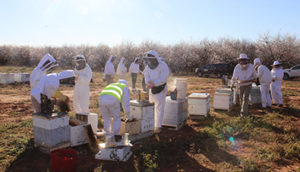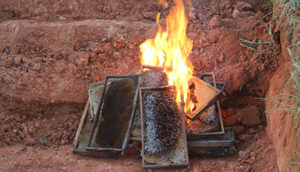Read the latest information on
Foot-and-mouth disease

Apiary officers, including the bee biosecurity officers, inspect hives during almond pollination to determine pest and disease status. Image: courtesy of Michael Holmes
Honey production is worth more than $100 million annually, along with sales of beeswax, queen and packaged bees. This is dwarfed by the benefits of bee pollination services.
In coming months around 200,000 beehives will be transported around growing regions in southern Australia for pollination, making effective biosecurity of bee hives more important than ever.
All commercial and hobby beekeepers are urged to adopt the Australian Honey Bee Industry Biosecurity Code of Practice to keep their bees healthy and to safeguard honey bee and pollination dependent industries.
Currently Australia is free of many serious honey bee pests that damage the health of European honey bees overseas. According to Dr Kath de Boer, the National Bee Biosecurity Program Coordinator at Plant Health Australia, exotic pests such as varroa, tropilaelaps or tracheal mites are a constant threat.
“As bad as these pests would be, their impact will be even worse if bee pests and diseases that are already in Australia – like American or European foulbrood and small hive beetle – are not being controlled,” said Kath.
The Code of Practice requires the nation’s 1500 commercial beekeepers who have more than 50 hives each, and the thousands of hobby beekeepers, to use best-practice biosecurity measures.
“The Code of Practice is meant to minimise the impact of pests and diseases, and to make sure the honey bees of Australia are as healthy as they possibly can be.”
The key elements include registration, hive inspections, controlling or eradicating pests and diseases, and reporting diseases.

There is no treatment for hives infected by American foul brood. Antibiotics can kill the bacteria but not spores, so the hive frame remains contaminated. Hives need to be burnt and buried, or irradiated. Photo: Michael Holmes
“To help beekeepers to implement biosecurity measures and to ensure they are adhering to the Code of Practice and relevant legislation, Bee Biosecurity Officers are available in five states located within each state department of primary industries,” said Kath.
“If you are a beekeeper and need advice about managing your hives or any aspect of the Code of Practice, you can contact one of the Bee Biosecurity Officers,” said Kath.
Commercial beekeepers can provide a declaration that they operate and manage their bee hives in compliance with the Code of Practice.
“Growers can ask beekeepers about compliance with the Code of Practice to ensure they are getting the services that they pay for when bringing in hives during pollination. They can also contact the Bee Biosecurity Officers for advice if they have any concerns about the health and performance of bees working their crop,” said Kath.
The contact details for the Bee Biosecurity Officers is available on the BeeAware website here.
For more information about bee biosecurity, the Code of Practice, pollination of crops by honey bees, bee pests, training, news and videos, go to the BeeAware website at beeaware.org.au